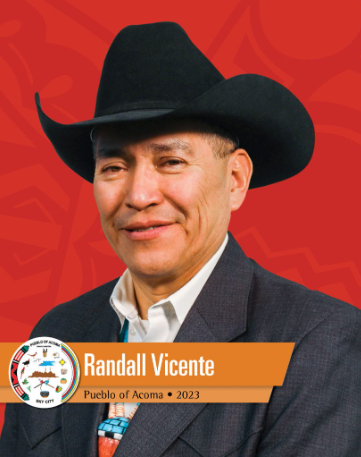
MY VIEW RANDALL VICENTE
On Aug. 10, 1680, a collective uprising of Pueblo peoples changed the trajectory of history here in the Southwest. The Pueblo Revolt, as it came to be known, was not merely a singular event in time, but a testament to the resilience and indomitable spirit of our people. More than three centuries later, the echoes of our ancestors’ resilient spirit reverberate in our hearts and throughout our lands, guiding our response to the threats to our sacred heritage.
In 1680, our ancestors rose in unity against oppressive forces, kindling a spirit of strength and resilience that would carry across generations. The Pueblo Revolt was a powerful rebuke of forces that sought to erase our identity, languages, culture, especially those practices considered sacred, profound and ancient. It marked a pivotal moment in our relentless struggle for cultural sovereignty.
Today, we find ourselves on the brink of yet another threat, not physical but equally significant — cultural erasure through congressional legislative actions. We are challenged by the proposed passage of House Resolution 4374, the “Energy Opportunities for All Act” introduced by Arizona House Republicans Eli Crane and Paul Gosar. HR 4374 aims to dismantle the protections established by Public Land Order 7923, issued recently by Secretary Deb Haaland and the Department of the Interior. The Public Land Order withdraws federal land and minerals in a critical 10-mile area around the Chaco Culture National Historical Park.
The Pueblo of Acoma, all Pueblos and the Hopi Tribe have stood firm in our view that Chaco Canyon and the Greater Chaco Region should not be exploited for economic development. Instead, it must be recognized for its historic and cultural significance. It is part of our ancestral homeland, containing an irreplaceable tapestry of stories, wisdom and continued spiritual nourishment captured in our songs and prayers. It is a testament to our past, a mirror reflecting the struggles and triumphs of our ancestors, the roads they established, the observatories they built, the vast trade network they created, and the sacred, ceremonial practices they passed on to us — the descendants.
Chaco is a place where we connect with our ancestors through song, prayer and pilgrimage, reminding us of the importance of preserving our heritage for the generations to come. It’s the same determination that sparked the Pueblo Revolt in 1680, which now drives our fight against HR 4374. Disguised as a policy for equitable energy development, HR 4374 stands as a stark, indisputable threat to our sacred lands. Its passage would facilitate continued destructive mineral exploitation, decimating not just the physical integrity of the Chaco Region but the cultural, spiritual and historical threads that bind us to that sacred space.
As we look back at the Pueblo Revolt, we recognize our ancestors’ resilience in the face of insurmountable odds. They united, they persevered, they prevailed — and we will do the same. The spirit of 1680 is not confined to the pages of history; it’s a living flame, fueling our shared commitment to protect our sacred spaces from HR 4374.
On Thursday, Aug. 10, let’s honor the legacy of our forebears by standing in unity, just as they did, to safeguard our cherished heritage. The struggle is not against a distant enemy but a present legislative threat that can erase parts of our living history.
We implore all tribes, indeed, all people who revere the preservation of historical, cultural and sacred spaces, to stand with us in opposing HR 4374. The fight for the Greater Chaco Region goes beyond tribal interests — it’s a fight for the shared cultural heritage of humanity. Our struggle may be different from the one in 1680, but our resolve remains as strong as ever. We remain committed to preserving our shared past, present and future, by ensuring the echoes of our ancestors’ courage continue to reverberate through time and history, and most importantly, withstands and overcomes shortsighted legislative policies.
Randall Vicente is governor of the Pueblo of Acoma.
